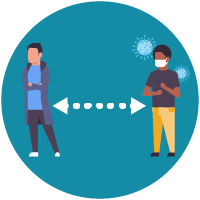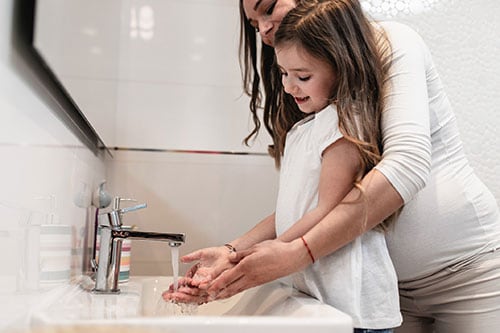coronavirus (14)
We are looking for Volunteers for Friday May 21st 1:30-5pm for CT Food Bank Distribution at Cornell Scott-Hill Health Center 428 Columbus Ave in parking lot. Please contact me at rmoody@cornellscott.org if you would like to volunteer. Thanks
In response to requests from local partners, DataHaven developed a report (see below) with our original analyses and visualizations of public data related to the coronavirus pandemic. These are updated as new data are posted. We have also created many other charts and datasets available on request...
https://www.ctdatahaven.org/reports/covid-19-connecticut-data-analysis
Prioritizing your mental health is more important than ever.
Inside Our Newsletter
- Discover great resources during the times of COVID and beyond (pg 3)
- Ease re-entry anxiety (and boost immunity) with essential oils (pg 12)
- Read about creative ways Continuum has been coping (pg 8)
- Nominate a Hero working with COVID patients to win Free Landscaping (pg 4)
- Get advice from an operator of our Safe Harbor Warm Line which provides a listening ear to 5,000 callers each month (pg 6)
*There's lot's more inside*
Click here for a downloadable newsletter with clickable links
On Tuesday, June 16, The Greater New Haven Chamber of Commerce’s Health Care & Life Sciences Council awarded Continuum in the Nonprofit Category at the 18th Annual Health Care & Life Sciences Awards.
The virtual ceremony recognized individuals and organizations that have gone above and beyond to support the Greater New Haven business community during COVID-19. Continuum was honored for the compassionate and proactive way in which all levels of our organization worked toward caring for and protecting our clients and staff during these several months of the COVID pandemic. The Chamber recognized Continuum’s efforts in implementing new policies for screening, and in proactively and vigorously protecting and nourishing clients and staff by providing supplies and tools for cleaning, protecting, working from home, adjusting staffing levels, and more amidst the crisis.
Honorees in each of the other category were: Well-Being/Wellness Program Honoree: Yale New Haven Hospital Employee & Family Resources (EFR); Clinical Program Honoree: Grant Street Partnership at Cornell Scott-Hill Health Center; Bio/Life Sciences Honoree: Homodeus, Inc. for their exciting new early, rapid, affordable coronavirus home test; Research Company Or Project Honoree: The Jackson Laboratory for the research and expert curated information relevant to coronavirus research; and Manufacturing Company Honoree: Bio-Med Devices for two specialized ventilators critical to treating the virus.
The event opened with an impressive panel of experts from Greater New Haven’s health care and life sciences community. Panelists discussed the current news on the COVID-19 pandemic in the State; innovative strides that companies in Greater New Haven have made in the areas of COVID-19 research, promising new therapies, tests, and vaccines; and solutions for addressing racial inequity in their respective fields. Panelists included Dr. Todd E. Arnold, Ph.D., Chief Laboratory Operations Officer, Sema4; Dr. Albert Ko, MD, Chair, Department of Epidemiology of Microbial Diseases, Yale School of Public Health; David Lehman, Commissioner & Governor’s Senior Economic Advisor, Connecticut Department of Economic and Community Development; George Llado, Senior Vice President and Chief Information Officer, Alexion Pharmaceuticals Inc.; and Erika R. Smith, CEO, ReNetX Bio, Inc.
Garrett Sheehan, President & CEO of the Greater New Haven and Quinnipiac Chambers of Commerce, shared, “Our region’s robust health care and life sciences community will advance health care across the Greater New Haven region. Panelists also affirmed that Connecticut, and specifically this region, are renowned as a primary bio science hub in the country.
During the ceremony, we shared a video of Continuum efforts during COVID. Check it out below.
Father's Day is around the corner. This year, why not honor your dad in a special way?
Make a gift to some very vulnerable people with urgent needs. Your donation will go directly to providing Continuum of Care's clients with food and basic needs to keep them nourished, sheltered, and protected.
The Centers for Disease Control and Prevention (CDC) took has unprecedented action on September 1 by issuing a temporary national moratorium on most evictions for nonpayment of rent to help prevent the spread of coronavirus. Citing the historic threat to public health posed by coronavirus, the CDC declared that an eviction moratorium would help ensure people are able to practice social distancing and comply with stay at home orders. The moratorium took effect September 4 and last until December 31, covering tens of millions of renters at risk of eviction.
More information and a printable declaration of inability to pay rent is linked here: Overview-of-National-Eviction-Moratorium.pdf
Please circulate to anyone you think might be able to use it.
Pandemics highlight global inequalities, from who is educated about a disease to who can afford a visit to the doctor if they get sick, to who can work remotely—or even take time off work—to recover and prevent the spread of the disease to others. Health officials have said it’s inevitable that America will see an outbreak of COVID-19, the novel coronavirus that was first reported in Wuhan, China, and has since spread to more than 60 countries, infecting more than 88,000 people so far...
Caregiving in a time of Coronavirus
A message from your Alzheimer’s Disease Research Center
We are addressing this to all the family members and friends who provide care for persons living with Alzheimer’s disease and similar dementias. The care you provide is always vital to the quality of life and well-being of that person. The Novel Coronavirus (COVID-19) pandemic places extra burdens on you in providing that care. We want to provide you with information you can use to strengthen the effectiveness of your caregiving and assist with your own peace of mind during this time.
Some Basic Facts. The information below represents what we currently know about COVID-19. We present these facts starkly because this is a serious situation. Having good information should help you to protect yourself and your person with dementia.
Something New. Novel Coronavirus – or COVID-19– is a new strain of a virus that attacks the respiratory system, but other organs as well. Because it is a new strain, very few people can resist it, no matter how hardy they may be. Our bodies haven’t seen this strain before, so our immune systems haven’t developed ways to fight it off. Also, there is, as yet, no vaccine, so no medical measures can yet be taken to protect us against it.
Serious. It is difficult at this time to have a very accurate picture, but Covid-19 appears to be a serious disease threat. The Centers for Disease Control and Prevention (CDC) include, in their range of possible futures for the illness, a prediction that more than half of the US population could be infected. The illness appears to have more serious outcomes than the flu, and death rate predictions are higher.
Risk Factors. COVID-19 requires the body’s immune system to mount a response to fight it off. So, anyone who has a weak immune system is at risk. Two factors are associated with weakened immune response: age and underlying chronic conditions. Those over 60, and especially those over 80 (even those who seem fit), are at higher risk for acquiring the illness. Also, individuals with chronic conditions like cancer, lung disease, diabetes, high blood pressure, and heart disease are at increased risk for COVID-19.
Points of Entry. The illness enters the body through the nose, eyes, or mouth and then proceeds to the lungs. This is why we are advised to avoid touching our face. It may also enter through particles in the air. This is why social distancing and avoiding crowded situations are recommended.
Alzheimer’s and COVID-19. The person for whom you provide care is in a high-risk situation. Most persons living with Alzheimer’s are over the age of 65 (one risk factor), and most persons over 65 have at least one, and typically more than one, chronic illness (the other risk factor).
The CDC website is an excellent source of reliable information: https://www.cdc.gov/coronavirus/2019-ncov/index.html
Local Health Department Numbers can be found here https://www.cdc.gov/coronavirus/2019-ncov/downloads/Phone-Numbers_State-and-Local-Health-Departments.pdf
Guidance for Caregiving. We recognize that we are relatively early in this outbreak and that information and guidance is coming out in an ongoing way, so the guidance we are providing is guidance for now. It will certainly change, and we will provide updates as we learn of them. Follow these general rules to protect you, the person you care for, and your family.
General Rules – Please follow these rules even if you or your person has not been diagnosed with COVID-19 or neither of you is showing signs of it.
Self-Care. The best protection for you and those you care for is for you not to acquire the virus. Do your best to stay healthy. Take your medications as prescribed and follow your exercise and rest programs.
Handwashing and Sanitizing. If you leave the home, always wash your hands when you return and frequently during the course of the day. Cleanse hands for at least 20 seconds (sing Happy Birthday twice). Use hand sanitizer often. Use hand lotion to prevent drying and cracking of skin.
In Your Home. Clean surfaces in your home using the CDC’s recommended solution of 4 teaspoons bleach per quart (4 cups) of water. Clean door knobs, sink handles, refrigerator and oven doors, steering wheels, and other high-use surfaces daily. Change hand and kitchen towels daily. Open windows (if possible) to increase ventilation. Do not share dishes and utensils.
Manage Underlying Chronic Conditions. Chronic conditions, such as diabetes, heart disease and COPD tax the immune system. Adhere to management regimens to prevent the condition from worsening. Ask providers to call in refill orders and see if the pharmacy can deliver – or has a drive through pickup window. Do this for the medications that both you and your care-recipient take.
Monitoring. Watch yourself and your person for symptoms (fever, cough, sore throat). Take your temperature occasionally.
Social Distancing. Remove yourself and your person from close contact with groups of people. This is admittedly very difficult, so here are some thoughts:
· If you are working outside the home, see if it is possible to work at a distance through telecommuting means (phone and videocall contact, etc.)
· Examine patterns of social interactions.
o If you regularly attend worship services, see if your place of worship offers streamed services, or consider using the regular time of attendance as a time of home worship.
o If you take your person shopping or to malls, reconsider. If you must, perhaps use smaller shops at off-hours, and avoid very crowded places. Call friends, family, or neighbors to see if they are going to the store and can pick up items you might need
o Think about outings that present minimal risks: going to large parks, taking walks
· Limit going out to restaurants – or stop altogether, order take out and see if they can deliver curbside
· Here’s a really hard one: family visits.
o Keep them small – one or two people at a time
o Ask everyone who comes to follow the same safety rules you are (wash hands)
o No grandkid visits
More Home Engagement Opportunities. If you have relied on outings – like those listed above – as a way to keep your person pleasantly occupied during the day, then removing them from the schedule means you have to fill in those times with other engaging tasks and activities. So, plan for that. Consider the kinds of at-home activities that seem to please and engage your person. Are there ways to repeat such activities over the course of a day? Are there similar kinds of activities you might try (if the person enjoys helping with cooking, might s/he enjoy helping with the laundry)? Try new things out and add those to your toolbox that you see to be working well.
Pay Attention to Your Own Isolation. If following the “rules” means you are finding yourself more homebound, be sure to check to see how this is making you feel. Take some preventive steps before you begin to feel a sense of being isolated. Make arrangements with family, neighbors and friends to have regular contact. Phone and FaceTime calls can be helpful. If you do take walks with your person, invite another person along. If a friend or family member can come in to be with your person for brief periods of time, seek and accept that help, and take yourself for an outing – observing all the rules when you return (and also the advice about having help come in).
Help from Outside the Home. If you have someone coming into the home to help care for your person, then the general rules should apply to them as well. The person should adhere to hand washing rules, be urged to follow good self-care procedures, and monitor him/herself for symptoms of COVID-19.
Medical Care. You are very likely in a position where you have to manage your person’s routine and chronic health care as well as to respond to changes in condition or react in an emergency situation. It’s important to recognize that, with COVID-19, you need to have a plan for how to handle some medical situations that might arise in the course of caregiving.
If you have a primary care provider (a nurse practitioner, physician, of physician assistant), contact the office to see if they have put procedures in place for handling routine visits and visits related to any concerns you may have should you observe possible COVID-19 symptoms. If they don’t, ask for advice about
· handling routine and chronic care situations that you’d usually manage by bringing the person to the office.
· Dealing with possible COVID-19 symptoms
· Expected delays for elective procedures
· Responding to emergency situations – should you call the office first? Go directly to an Emergency Department?
If you feel you have an emergency, but are not sure, and cannot get through to your primary care provider, call your local Emergency Department. Most have a nurse or physician on duty who can offer advice about the need to come in immediately or wait at home.
If you think you or your person might be showing signs of COVID-19 and think you should be tested, it’s important to call your primary care provider (or the Emergency Department) first. They may be able to provide advice about where and if you need to be tested immediately or to wait. The clinic office or Emergency Department may not be where you can get tested
If you are a participant in a research study, call your research coordinator for instructions for follow up.
If Your Person is Living in an Assisted Living or Skilled Nursing Facility:
It is increasingly likely that visitors, even close family, will not be permitted to visit relatives in such facilities.
The staff will continue to provide care and comfort, but you will not be able to have in-person time with the person that may be important to you. If you are alone and feeling this as yet another loss, take action. Try to go out for a walk, call family and friends, listen to your favorite music, look at scrapbooks or read a good book. If you belong to a church or synagogue, call and ask to be put on a prayer list. Many religious staff are working from home and can respond to your messages. Have family and friends mail cards and letters to them.
This guide includes resources by grade from Pre-K to High School, by subject and for English learners. Get it here:
The city has launched a new website focused entirely on the local impact of the COVID-19 impact.
The site is dubbed the “City of New Haven Coronavirus (COVID-19) Hub.”
Click here to go to the site.
It includes guidance documents for homeless shelters, private schools, childcare centers, and local businesses...
https://www.newhavenindependent.org/index.php/archives/entry/city_launches_covid-19_website/
There is a COVID-19 outbreak in our community, it could last for a long time. (An outbreak is when a large number of people suddenly get sick.) Public health officials have recommend community actions to reduce people’s risk of being exposed to COVID-19. Get official information here. Your actions can slow the spread and reduce the impact of this disease.
Prepare and take action for COVID-19

Take extra measures to put distance between yourself and other people to further reduce your risk of being exposed to this new virus.
- Stay home as much as possible.
- Consider ways of getting food brought to your house through family, social, or commercial networks
|


